*** Proof of Product ***
Exploring the Essential Features of “Daniel J Moran – Acceptance, Commitment Therapy”
- Integrate ACT techniques and skills into your current practice
- Simplify and implement ACT concepts
- Case examples, video clips and role-play
Integrating Acceptance and Commitment Therapy into your practice offers a new way for you to achieve positive therapeutic outcomes with difficult-to-treat clients.
Join experienced ACT presenter Daniel J. Moran, Ph.D., BCBA-D, as he delivers an exercise and technique-heavy course that will give you the tools needed to more effectively treat clients with depression, anxiety, trauma, and the personality disorders.
Dr. Moran will teach you the main concepts of ACT, including mindfulness, acceptance, and defusion–demonstrating how these create greater psychological flexibility. Discover a variety of techniques for helping clients who are struggling to make difficult behavior changes due to the presence of painful thoughts, feelings and memories. You will learn how to effectively use metaphors, custom techniques and experiential exercises to help your clients identify their values and translate them into behavior goals.
Through case examples, video clips, and role-play you will be able to integrate ACT techniques and skills in your practice tomorrow!
- Define ACT concepts such as experiential avoidance and cognitive defusion.
- Illustrate the role of psychological flexibility in ACT and list techniques for increasing it.
- Identify how to reduce experiential avoidance by implementing emotional and behavioral willingness techniques with clients.
- Demonstrate how ACT incorporates elements of exposure therapy to reduce experiential avoidance.
- Discover core ACT concepts through the use of role-playing, case examples and clinical videos.
- Integrate ACT techniques into treatment for specific disorders including depression, anxiety, trauma and the personality disorders.
ACT in a Nutshell
- The role of values: mindfulness, acceptance, commitment, behavior
- Experiential avoidance
- Existential behaviorism
- Psychological flexibility
- ACT for anxiety, depression, trauma and personality disorders
- Disorder-specific strategies
- Common treatment elements
- Metaphors, paradox and experiential exercises
Role of Exposure in ACT
- Translate client values into behavioral goals
- Barriers to behavioral goals: external and internal avoidance
- External Exposure
- Situations
- People
- Internal Exposure
- Thoughts
- Emotions
- Memories
- Bodily sensations
ACT in Action
- Anxiety
- Client avoidance strategies (including rumination)
- Clean vs. dirty anxiety
- Attack reason giving
- Anxiety detector exercise
- Turn up the willingness knob
- Mountain of food metaphor
- Passengers on the bus metaphor
- And vs. but
- Trauma
- Function of trauma symptoms
- Specify treatment goals
- Target self-harm behaviors
- Increase psychological safety
- Tin can monster exercise
- Mindfulness exercises
- Depression
- Role of avoidance in depression
- Target suicidality
- Evaluation vs. description exercise
- Buy thoughts and defuse language
- Observing self-exercise
- Personality Disorders
- Increase emotional tolerance
- Values clarification
- Mind vs. experience
- Man in the Hole analogy
- Target the client’s story
- Work with client anger
- Role of therapist self-disclosure
- Chessboard metaphor
Please see the full list of alternative group-buy courses available here: https://lunacourse.com/shop/










 Emanuele Bonanni - My Trading Way
Emanuele Bonanni - My Trading Way  Ronald D. Siegel - Mindfulness Exercise for Chronic Pain
Ronald D. Siegel - Mindfulness Exercise for Chronic Pain  Louise Yamada - Market Magic: Riding the Greatest Bull Market of the Century
Louise Yamada - Market Magic: Riding the Greatest Bull Market of the Century  SMB - Options Training
SMB - Options Training  Dave Landry - Stock Selection Course
Dave Landry - Stock Selection Course  Chris Capre - Advanced Price Action Ongoing Training & Webinars
Chris Capre - Advanced Price Action Ongoing Training & Webinars  Crypto Dan - The Crypto Investing Blueprint To Financial Freedom By 2025
Crypto Dan - The Crypto Investing Blueprint To Financial Freedom By 2025  Racing Workshop - Complete Online Package
Racing Workshop - Complete Online Package  Atlas API Training - API 570 Exam Prep Training Course
Atlas API Training - API 570 Exam Prep Training Course  Team NFT Money - Ultimate NFT Playbook
Team NFT Money - Ultimate NFT Playbook  Fred Haug - Virtual Wholesaling Simplified
Fred Haug - Virtual Wholesaling Simplified  Matthew Kratter - Trader University
Matthew Kratter - Trader University  Trio Chausson - Fanny & Felix Mendelssohn
Trio Chausson - Fanny & Felix Mendelssohn  Alton Hardin - Crush Micro Stakes Online Poker
Alton Hardin - Crush Micro Stakes Online Poker  Anil Batra - GA4, GTM, BigQuery, and Data Studio Fundamentals - Mini Workshop
Anil Batra - GA4, GTM, BigQuery, and Data Studio Fundamentals - Mini Workshop  Erik Banks - Alternative Risk Transfer
Erik Banks - Alternative Risk Transfer  Gumroad Guru - The Persuasion Code - How to Start and Scale Your Affiliate Marketing
Gumroad Guru - The Persuasion Code - How to Start and Scale Your Affiliate Marketing  Jesse Livermore Trading System - Joe Marwood
Jesse Livermore Trading System - Joe Marwood  Ready Set Crypto - Crypto Bootcamp All You Need To Know To Make $$ With Crypto
Ready Set Crypto - Crypto Bootcamp All You Need To Know To Make $$ With Crypto  Money Miracle - George Angell - Use Other Peoples Money To Make You Rich
Money Miracle - George Angell - Use Other Peoples Money To Make You Rich  Jessica Caver Lindholm - Sell Like a Boss
Jessica Caver Lindholm - Sell Like a Boss  Courtney Holmes - Filming Families: The Modern Family Video
Courtney Holmes - Filming Families: The Modern Family Video  Cody Neer - Ecommerce Brand Academy
Cody Neer - Ecommerce Brand Academy  Wilco De Kreij Protect Your Facebook Ad Account
Wilco De Kreij Protect Your Facebook Ad Account  Lillian Gibson - Culturally Affirming Practices for Whole Person Treatment - PESI
Lillian Gibson - Culturally Affirming Practices for Whole Person Treatment - PESI  Matan Feldman - The 13-Week Cash Flow Modeling - Wall Street Prep
Matan Feldman - The 13-Week Cash Flow Modeling - Wall Street Prep  Nathan Fluellen - Discovering West Africa: Ghana, Senegal, Cameroon
Nathan Fluellen - Discovering West Africa: Ghana, Senegal, Cameroon  Brynne Tillman & Bill McCormick - Mastering Linkedin for Social Selling | Advanced Prospecting and Networking - Sales Gravy
Brynne Tillman & Bill McCormick - Mastering Linkedin for Social Selling | Advanced Prospecting and Networking - Sales Gravy  Oliver Velez - Essential Strategy Of Trade For Life
Oliver Velez - Essential Strategy Of Trade For Life  The Video formula - Kevin Anson
The Video formula - Kevin Anson  Vladimir Vasiliev - Path to Mastery 1 (downloadable in 2 parts*)
Vladimir Vasiliev - Path to Mastery 1 (downloadable in 2 parts*)  Terry Real - Teaching Men Love: How to Challenge Traditional Masculinity's Playbook - PESI
Terry Real - Teaching Men Love: How to Challenge Traditional Masculinity's Playbook - PESI  George Fontanills & Tom Gentile - Optionetics 6 DVD Series Home Study Course (Digital Download)
George Fontanills & Tom Gentile - Optionetics 6 DVD Series Home Study Course (Digital Download)  Tara Brach - Awaken Your Heart, Creativity & Wisdom
Tara Brach - Awaken Your Heart, Creativity & Wisdom 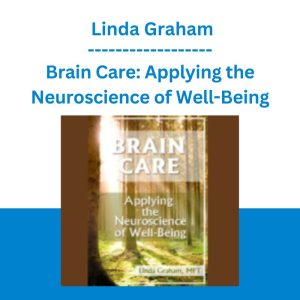 Brain Care: Applying the Neuroscience of Well-Being - Linda Graham
Brain Care: Applying the Neuroscience of Well-Being - Linda Graham  Adam Gilad - Interview With Satyen Raja
Adam Gilad - Interview With Satyen Raja  Toshko Raychev - Profit System + ITF Assistant
Toshko Raychev - Profit System + ITF Assistant  Steve G, Jones - Explore Hand Writing
Steve G, Jones - Explore Hand Writing  Frank Kern - The Invisible Offer
Frank Kern - The Invisible Offer  Jared Platt - Editing and Retouching in Lightroom Mobile
Jared Platt - Editing and Retouching in Lightroom Mobile  Sara Gottfried - Fast Track Your Hormone Cure (10-Day Program)
Sara Gottfried - Fast Track Your Hormone Cure (10-Day Program)  Patricia Arredondo - BT18 Keynote 01 - LatinX Immigrant Resilience in the Midst of Change and Challenges
Patricia Arredondo - BT18 Keynote 01 - LatinX Immigrant Resilience in the Midst of Change and Challenges  Sandra Ingerman - Shamanic Journeying With the Spirits of Nature - The Shift Network
Sandra Ingerman - Shamanic Journeying With the Spirits of Nature - The Shift Network  Kelli Marie Connor - Hype & Reminders Workflow - CRM Workflow Bundle
Kelli Marie Connor - Hype & Reminders Workflow - CRM Workflow Bundle  Alex Brogan - The Sovereign Creator – Grow a 6-figure audience (without leaving your day job)
Alex Brogan - The Sovereign Creator – Grow a 6-figure audience (without leaving your day job)  Danny Zacharias - Mastering Logos Bible Software to Supercharge Your Bible Study!
Danny Zacharias - Mastering Logos Bible Software to Supercharge Your Bible Study! 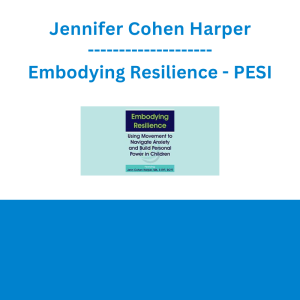 Jennifer Cohen Harper - Embodying Resilience: Using Movement to Navigate Anxiety and Build Personal Power in Children - PESI
Jennifer Cohen Harper - Embodying Resilience: Using Movement to Navigate Anxiety and Build Personal Power in Children - PESI  Ed Ponsi - Forex Trading
Ed Ponsi - Forex Trading  Brooke Wimer - Animal-Assisted Interventions: An Incredible Range of Therapeutic Benefits - PESI
Brooke Wimer - Animal-Assisted Interventions: An Incredible Range of Therapeutic Benefits - PESI 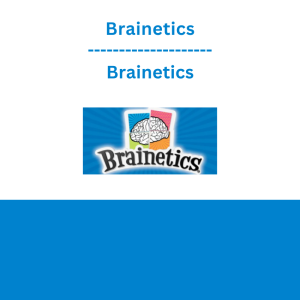 Brainetics
Brainetics  Jessica Renee - Booty Butt Lift - Hamstrings & Glutes
Jessica Renee - Booty Butt Lift - Hamstrings & Glutes  Bashar - The Self Empowerment Workshop
Bashar - The Self Empowerment Workshop  Mike Hagen - DIY Photography: Lens Attachments, Filters & Creative Effects
Mike Hagen - DIY Photography: Lens Attachments, Filters & Creative Effects  Melissa Cassera - Write Copy that Compels and Sells
Melissa Cassera - Write Copy that Compels and Sells 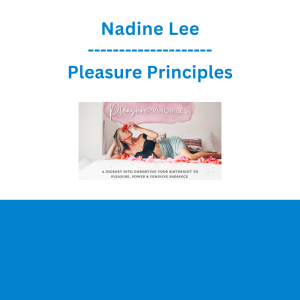 Nadine Lee - Pleasure Principles
Nadine Lee - Pleasure Principles  Gary Marks - Rocking Wall Street
Gary Marks - Rocking Wall Street 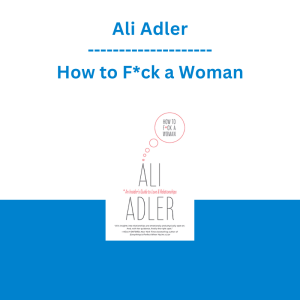 Ali Adler - How to F*ck a Woman
Ali Adler - How to F*ck a Woman